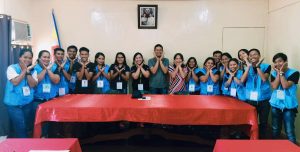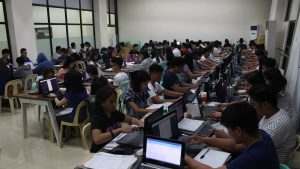Butuan City- A total of 485,319 households were assessed by the Listahanan Field Workers of the Department of Social Welfare and Development (DSWD) Field Office Caraga during the 3rd round household assessment in the region.
This figure is based on reports submitted on December 16, 2019 – which is the last day of the allotted 45-day actual household assessment period. This number covers assessed households from the 1,311 barangays in 67 municipalities and 6 cities all over the region.
Regional Director Mita Chuchi Gupana-Lim is thankful to the dedicated field staff who worked hard in the assessment of households, even covering Geographically Isolated and Disadvantaged Areas (GIDAs).
“I sincerely appreciate all your hard work and dedication. With your commitment to the department, we we’re able to assessed these households which we cannot do it alone. Despite of short engagement, you have shown the character of true public servants – reaching out to those who are in need,” Dir. Lim said.

The 3rd Round Household Assessment is conducted to collect pertinent data/information of households all over the Philippines to give the agency a clearer picture of who and where the poor are in the country. This way, it would be easier for agencies and organizations to identify individuals, families, and communities needing social welfare and protection programs and services.
“Remember, the moment you left at the doorsteps of the assessed households, you’re giving them hope that they will be one of those households who will benefit from programs and services from the government,” Dir. Lim added.
On the other hand, Regional Field Coordinator Aldie Mae A. Andoy thanked the Local Government Units (LGUs) for providing support to the field staff since day 1 until the end of the assessment.
“We would like to thank all the Provincial/Municipal/City/Barangay LGUs, in partnership with the DILG, for extending support and assistance to our deployed field workers by providing the necessary augmentation support during the household data collection. The counterparts you have provided for our field staff in reaching even the most far-flunged areas, and access to facilities and other resources since day 1, made this challenge easier and possible,’’ Andoy said.
“We work truly as one in reaching the poor, vulnerable and disadvantaged. We have exerted our best efforts in gathering accurate information from the respondents during the house to house visit. This Listahanan database will help identify potential beneficiaries for social protection programs,” Andoy added.
Area Coordinator Cornelio Cabreto assigned in Cabadbaran and RTR was grateful for DSWD for the experience he had with Listahanan.
“It was a nice feeling, being one of the instrument to see the actual living conditions of the householders and hear the voice of those who are in need of the government’s support. Thank you DSWD for this unforgettable experience,” Cabreto said.
The program handlers would like to clarify that not all assessed households are automatically recipient of any programs and services of the government. The collected information is encoded to the database and subject to the Proxy Means Test – a statistical model that estimates the per capita income of the households using proxy means variable. After which, the initial list of poor households would be generated and will be posted at the barangay level for transparency, as early as the 1st quarter of 2020.
Listahanan activities will continue in the 1st quarter of 2020 with the conduct of the creation of Barangay Verification Teams and Local Verification Committees, who will see to it that the poor and non-poor list of households are correct. A Barangay Assembly will also be conducted for the community to view the list of households – so that the public may raise their queries/questions, clarifications, and grievances of the initial list of poor and non-poor.
During this period, those who have not been assessed may request for an assessment, and those who have questions about the initial result may file for grievances.

The Validation and Finalization Phase for the 3rd round assessment will then commence once all the grievances will be addressed. For those who are questioning the results may raise their issues. The Listahanan team may revalidate those households who would challenge the results – households who consider themselves poor, but listed as non-poor may ask for a revalidation. Then will the Listahanan be able to finalize its database.
As of now, encoding activities supervised by Regional Information Technology Officer (RITO) Raffy C. Pocon are still on-going at the CSU Main Campus where 144 encoders are hired to encode the information collected from the households.

